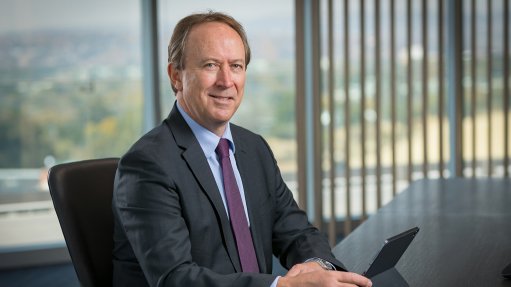
Fleetwood Grobler is the inaugural chair of the Energy Council of South Africa
Mineral Resources and Energy Minister Gwede Mantashe has expressed optimism that the newly established Energy Council of South Africa will provide a platform for greater coordination and cohesion within the sector, which has hitherto approached government and debates on the energy transition as “competitors” rather than as a unified voice.
The CEO-led council was officially launched on Tuesday and includes representatives from Eskom, Sasol, the Central Energy Fund, Anglo American Platinum, Exxaro, TotalEnergies South Africa and the Industrial Development Corporation (IDC), as well as Business Unity South Africa, the Black Business Council, the National Business Initiative, the South African Petroleum Industry Association, Naamsa | The Automotive Business Council and the Minerals Council South Africa.
None of the renewable-energy, battery storage or energy efficiency associations were immediately represented, neither were any independent power producers or their associations.
However, chairperson Fleetwood Grobler, who is also CEO of Sasol, said that such associations and representatives would be included in future and indicated that their exclusion from the launch was “not by design” and driven, instead, by the fact that a critical mass of industry participants were ready to initiate a structure long called for by Mantashe.
The energy council, Grobler said, would advance the values of “one unified sector, accountability and transparency” and would focus on four strategic areas, including:
- crafting a common vision for the sector;
- collaboratively developing a national energy strategy;
- contributing to the development of enabling policies and a supportive environment for the sector; and
- attracting and ensuring sustainable investment that supports industrialisation, localisation and job creation.
A CEO for the council would be appointed in due course with the aim of establishing a body similar to the Minerals Council South Africa, which was previously known as the Chamber of Mines and has been seen as the voice of the industry for more than a century.
Mantashe, who described the establishment of the council as “long overdue”, expressed optimism that having a single formation would decrease the current “polarised” nature of the discussion about the energy transition, which he argued was distorting the debate.
He again insisted that it would be “economic suicide” for South Africa to move too hastily away from coal and said that the demands of developed countries for South Africa to abandon the energy mineral should be resisted.
Nevertheless, he described as “ridiculous” any suggestion that he would reject the initial commitment of $8.5-billion (made by France, Germany, the UK, the US and the European Union) over the next three to five years to support South Africa’s “just transition to a low carbon and climate-resilient economy”.
Instead, he would seek to play a direct role in ensuring that any transition projects were implemented in a way that was both “systematic and pragmatic”.
All the founding CEOs who made addresses during the virtual launch of the council pointed to serious economic and trade risks should South Africa fail in its transition from coal to cleaner energy.
Toyota South Africa Motors CEO Andrew Kirby, who represents Naamsa in the council, said the decarbonisation of the country’s electricity mix would be key to automakers sustaining their exports to developed countries, some of which were considering the imposition of carbon tariffs.
Likewise, any move to manufacture new energy vehicles domestically would have to be made “in step with the transition to renewable energy” in light of the export-intensity of the industry.
The opportunities of the transition were also underlined, particularly by Anglo American Platinum CEO Natascha Viljoen, who highlighted the potential for South Africa to be a green hydrogen exporter, as well as a producer of several of the minerals required for the clean-energy transition.
Meanwhile, IDC CEO TP Nchocho said that the development finance institution stood ready to support Eskom in funding the grid infrastructure required to unlock South Africa’s best renewables resources in provinces such as the Northern Cape.
Launched against the backdrop of ongoing load-shedding, Grobler said that the new council was fully aware that energy was currently one of the top agenda items for government and industry.
“The discussions and debates currently in the public domain are clearly robust.
“They reflect the complexities of the need to ensure energy security, while transitioning our economy towards a low-carbon future,” he said, underlining the importance of navigating the transition in a way that was just for workers and communities linked to coal supply chains.
“Bringing together a diversity of voices within the energy sector will enable us to tap into the collective wisdom and expertise of our founding and future members to shape a sustainable energy sector.”